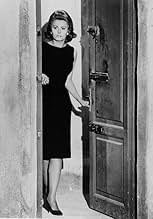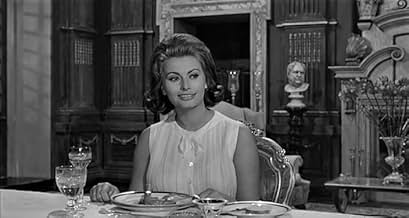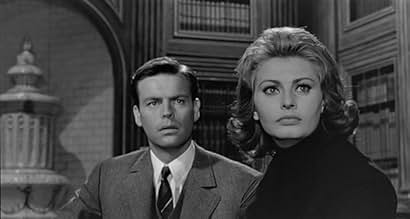IMDb RATING
6.7/10
697
YOUR RATING
An insane German war criminal lives in a secluded house owned by his rich father who lets him think the war is still on, some 15 years after the fact.An insane German war criminal lives in a secluded house owned by his rich father who lets him think the war is still on, some 15 years after the fact.An insane German war criminal lives in a secluded house owned by his rich father who lets him think the war is still on, some 15 years after the fact.
- Director
- Writers
- Stars
- Awards
- 2 wins & 1 nomination total
Carlo Antonini
- Police Official
- (uncredited)
Antonia Cianci
- Maid
- (uncredited)
Alfredo Franchi
- Groundskeeper
- (uncredited)
Roberto Massa
- Chauffeur
- (uncredited)
Osvaldo Peccioli
- Cook
- (uncredited)
Lucia Pelella
- Groundskeeper's wife
- (uncredited)
- Director
- Writers
- All cast & crew
- Production, box office & more at IMDbPro
Featured reviews
I always regarded "The Prisoners of Altona" as Sartre's most interesting and perhaps best play, but I did not know that Vittorio de Sica had made a film on it and with Sophia Loren and other great actors, Cesare Zavattini having even somewhat added to the play. The main interest of the play is that it's a Frenchman's assessment of the post-war German situation with acute observations, conclusions and profound considerations. The main character Franz has never left the war behind, while his father, a great industrialist tycoon, has received his own death sentence by a cancer diagnosis and faces the problem and necessity of allowing his life's work a continuity. He has another son (Sophia Loren's husband, Robert Wagner,) who is willing to accept to take over, but his elder brother looms as the bearer of an ominous destiny of the family. Franz (Maximilian Schell) ultimately refuses to accept that Germany is flourishing again, that it is rising to new power and prosperity and clinches to his experience of a defeated nation all in ruins with its people resorting to underground beggary and scavenging, as if the reality of its ruin was of greater comfort to him than any news of its prosperity. Vittorio de Sica made this film two years after "Two Women", and it's in the same vein - relentless realism brought to overwhelming pathos and tragedy. He alternated his serious films with comedies and loved to act himself in comedies, he was more active as an actor and comedian than as a director, but his serious films remain his masterpieces. There is no sweet and lovely Italian music here but the bleak and depressive wailing disharmonies of Shostakovich instead, which actually provide an appropriate mood and accompaniment to this very morose film. It's not one of his best films, but it certainly belongs to his most interesting.
Perhaps because I saw this film dubbed in Italian with English subtitles and missed the familiar voices of Fredric March, Maximilian Schell, and Robert Wagner I was put off somewhat. But The Condemned Of Altona just did not rise to what I was expecting. Or maybe it was Jean-Paul Sartre's view of the world.
Whatever it was his ideas just did not translate well to the big screen. Meet the family Gerlach, father Fredric March big German industrial tycoon and his children Maximilian Schell, Robert Wagner, and Francoise Prevost. Germany may have lost the war, but her natural resources and the need for an anti-Communist bulwark in the Cold War have made her richer than ever, if de-Nazified.
March has been told he's terminally ill and has six months tops. He's troubled about his choices. The younger son Robert Wagner is not fit material for a tycoon and in the patriarchal society Francoise Prevost is out of the question.
Then there's Maximilian Schell who has self secluded and deluded. He's a wanted war criminal from World War II and he's imposed an exile on himself. He believes because he knows no better that Germany is a vast rubble.
Bringing him out of his exile is Wagner's new wife Sophia Loren who's been wondering about that locked section of that Gothic manor the Gerlachs have for themselves.
As for the rest all I can say is Schell's guilt is the engine that drives the rest of the film. The best part of the film is something that could not be done on stage. Schell finally lose and seeing with his own eyes, the prosperity and the bustling night life that was Hamburg. Wonder if he went to the clubs and found some musicians from Liverpool who would shake the world soon?
I did see this on stage at Lincoln Center a couple of years after the film had been made of Jean-Paul Sartre's play with George Coulouris heading the cast as the family patriarch. As he is often on screen, Coulouris was mesmerizing in self absorption and monomania about seeing his industrial complex carrying on. By contrast March seemed dull and lifeless and this has to rank as one of his lesser films. But not to single him out alone, the whole cast was the same way with the exception of Schell. But he's got the best part of a man who had to enlist in the army after his father got him off from protecting a Rabbi to a man who committed war atrocities on the Russian front.
Sartre was saying that war itself can make people do evil things. And that the true guilty parties never saw any punishment, on the contrary like March they triumphed in defeat.
In other words, what a world.
Whatever it was his ideas just did not translate well to the big screen. Meet the family Gerlach, father Fredric March big German industrial tycoon and his children Maximilian Schell, Robert Wagner, and Francoise Prevost. Germany may have lost the war, but her natural resources and the need for an anti-Communist bulwark in the Cold War have made her richer than ever, if de-Nazified.
March has been told he's terminally ill and has six months tops. He's troubled about his choices. The younger son Robert Wagner is not fit material for a tycoon and in the patriarchal society Francoise Prevost is out of the question.
Then there's Maximilian Schell who has self secluded and deluded. He's a wanted war criminal from World War II and he's imposed an exile on himself. He believes because he knows no better that Germany is a vast rubble.
Bringing him out of his exile is Wagner's new wife Sophia Loren who's been wondering about that locked section of that Gothic manor the Gerlachs have for themselves.
As for the rest all I can say is Schell's guilt is the engine that drives the rest of the film. The best part of the film is something that could not be done on stage. Schell finally lose and seeing with his own eyes, the prosperity and the bustling night life that was Hamburg. Wonder if he went to the clubs and found some musicians from Liverpool who would shake the world soon?
I did see this on stage at Lincoln Center a couple of years after the film had been made of Jean-Paul Sartre's play with George Coulouris heading the cast as the family patriarch. As he is often on screen, Coulouris was mesmerizing in self absorption and monomania about seeing his industrial complex carrying on. By contrast March seemed dull and lifeless and this has to rank as one of his lesser films. But not to single him out alone, the whole cast was the same way with the exception of Schell. But he's got the best part of a man who had to enlist in the army after his father got him off from protecting a Rabbi to a man who committed war atrocities on the Russian front.
Sartre was saying that war itself can make people do evil things. And that the true guilty parties never saw any punishment, on the contrary like March they triumphed in defeat.
In other words, what a world.
I like most movies De Sica directed but this is a mediocre tale of a German industrialist dying of cancer, who wants to leave his estate to his second son Werner, while his first son Franz who was a Nazi officer, to escape justice is sheltered in his father's estate and thinks the war is still going on in 1962. It is based on a play by Sartre, which I guess was not successful, and like most movies based on plays, it feels claustrophobic.
Sophia Loren plays Werner's wife and since the movie producer was Carlo Ponti, he used this opportunity - like many other - to showcase his girlfriend Loren as a "real actress". Loren'skills as an actress are debatable, and even Ponti preferred to bet on some of her other assets. That's why even if the action takes place in freezing Hamburg, in a long key scene Loren wears a slip dress, displaying her ample cleavage.
Totally missable, third-rate movie.
Sophia Loren plays Werner's wife and since the movie producer was Carlo Ponti, he used this opportunity - like many other - to showcase his girlfriend Loren as a "real actress". Loren'skills as an actress are debatable, and even Ponti preferred to bet on some of her other assets. That's why even if the action takes place in freezing Hamburg, in a long key scene Loren wears a slip dress, displaying her ample cleavage.
Totally missable, third-rate movie.
When a movie from 1962 has less than 200 votes on IMDb, what does it mean? Directed by legendary De Sica, and starring great Sophia Loren... it must be a terrible failure? Well, it isn't.
Having read Sartre's play "The Condemned of Altona", it is my impression that the movie is very faithful to its atmosphere. There are some changes, of course: instead of concentrating exclusively on torturing his characters inside the mansion (as Sartre does), De Sica takes advantage of possibilities of film, adding outdoor scenes.
I don't want to reveal the plot, although it is very interesting. I recommend reading the play first, since the relations between characters will be clearer then. Anyway, see this movie if you get the chance!
Having read Sartre's play "The Condemned of Altona", it is my impression that the movie is very faithful to its atmosphere. There are some changes, of course: instead of concentrating exclusively on torturing his characters inside the mansion (as Sartre does), De Sica takes advantage of possibilities of film, adding outdoor scenes.
I don't want to reveal the plot, although it is very interesting. I recommend reading the play first, since the relations between characters will be clearer then. Anyway, see this movie if you get the chance!
The Condemned of Altona.
This is a film I saw a few times and would like to see again 40 years later. Based on Jean-Paul Sartre about WW2 and the NEW Germany in German eyes. The central character, Franz Gerlach, has kept himself locked in the attic of his father's house for many years because his Nazi Past. Sophia Loren as Johanna visits him in the attic. Loren and all the actors play difficult parts. Reminds me of Boll and Gunther Grass. Those Germans who can not forget what happened in World War 2. A 10 from me, a must see Drama that has been done on stage too. Is there a DVD Copy available? I saw it on TV and at the Cinema in the 1960's.
This is a film I saw a few times and would like to see again 40 years later. Based on Jean-Paul Sartre about WW2 and the NEW Germany in German eyes. The central character, Franz Gerlach, has kept himself locked in the attic of his father's house for many years because his Nazi Past. Sophia Loren as Johanna visits him in the attic. Loren and all the actors play difficult parts. Reminds me of Boll and Gunther Grass. Those Germans who can not forget what happened in World War 2. A 10 from me, a must see Drama that has been done on stage too. Is there a DVD Copy available? I saw it on TV and at the Cinema in the 1960's.
Did you know
- TriviaSpencer Tracy was offered but declined the role of Albrecht von Gerlach.
- GoofsNazi uniforms were banned after the war, yet Franz walks through the city without being arrested or beaten up. He gets a few strange looks but is otherwise ignored.
- Alternate versionsEvery reference to National Socialism was cut from the West German version in 1962.
- How long is The Condemned of Altona?Powered by Alexa
Details
- Release date
- Countries of origin
- Languages
- Also known as
- Die Eingeschlossenen
- Filming locations
- Production companies
- See more company credits at IMDbPro
Box office
- Gross US & Canada
- $2,398,000
- Runtime
- 1h 54m(114 min)
- Color
- Sound mix
- Aspect ratio
- 2.35 : 1
Contribute to this page
Suggest an edit or add missing content





























